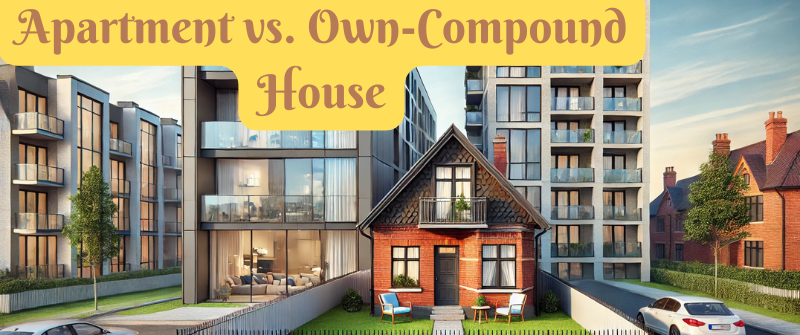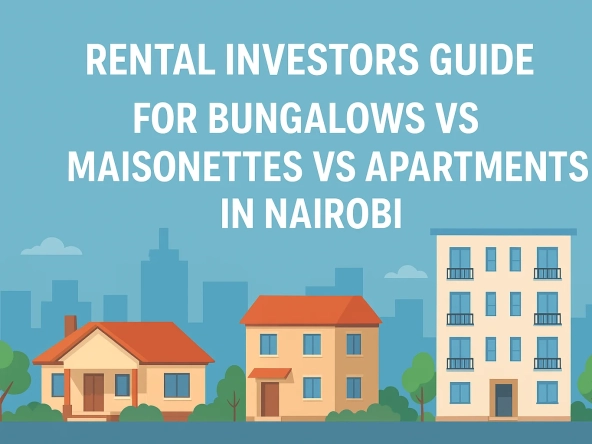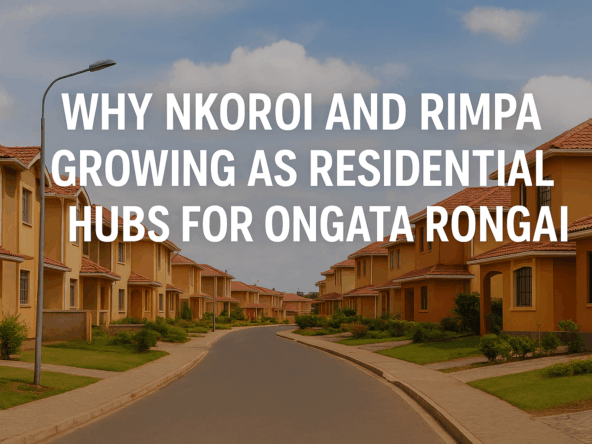Buying a home is one of the most significant financial and lifestyle decisions. Prospective homeowners often have the choice of purchasing an apartment or a compound house.
Both options have advantages and drawbacks, and the right choice depends on budget, lifestyle, security, maintenance, and long-term plans.
This comprehensive guide will help you evaluate the following aspects.
Factors to consider when Deciding between an Apartment or an Own-Compound House

1. Cost and Affordability
- Apartment: Apartments are generally more affordable than own-compound houses because they require less land and share construction costs among multiple units. They are an excellent option for first-time buyers or those on a limited budget.
- Own-Compound House: Owning a standalone house requires purchasing land and bearing the entire construction cost. However, it provides long-term value and potential appreciation, making it a good investment if financially feasible.
2. Space and Privacy
- Apartment: Apartments are typically more compact, offering limited living space and no private yard. Walls are often shared with neighbors, reducing privacy.
- Own-Compound House: These homes provide more space, including a yard or garden. They offer greater privacy since no shared walls exist, making them ideal for families.
3. Security Considerations
- Apartment: Most apartments have security features such as gated entrances, CCTV surveillance, and guards, which reduce the risk of intrusions.
- Own-Compound House: Security is entirely the owner’s responsibility, requiring investments in gates, fences, alarm systems, and possibly private security services.
4. Maintenance and Upkeep
- Apartment: Maintenance costs are generally lower, as the property management team handles responsibilities such as landscaping, waste management, and repairs.
- Own-Compound House: Homeowners are fully responsible for all maintenance, including plumbing, roofing, and gardening, which can be time-consuming and costly.
5. Investment and Resale Value

- Apartment: Apartments are easy to rent out, making them a good source of passive income. However, due to wear and tear, they may depreciate faster than standalone homes.
- Own-Compound House: Standalone houses tend to appreciate value more over time, especially in prime locations, making them a solid long-term investment.
6. Lifestyle and Convenience
- Apartments are ideal for young professionals, singles, and small families who prioritize convenience. They are often located in urban areas close to workplaces, shopping centers, and entertainment.
- Own-Compound House: This type of property is better suited for larger families, retirees, or individuals who prefer a quieter and more independent lifestyle.
7. Expansion and Customization
- Apartment: Limited customization options, as significant renovations require management or homeowners’ association approval.
- Own-Compound House: This type of house offers full flexibility for modifications, expansions, or additional construction, such as adding extra rooms, a swimming pool, or an outdoor entertainment area.
8. Community and Social Life
- Apartment: Apartments provide a built-in social environment with shared amenities like gyms, pools, and playgrounds. However, they may also come with restrictions on noise levels and renovations.
- Own-Compound House: Offers more solitude and freedom but may require extra effort to engage in a community.
Advantages of Owning Land as Part of an Own-Compound Home
Full Ownership and Control
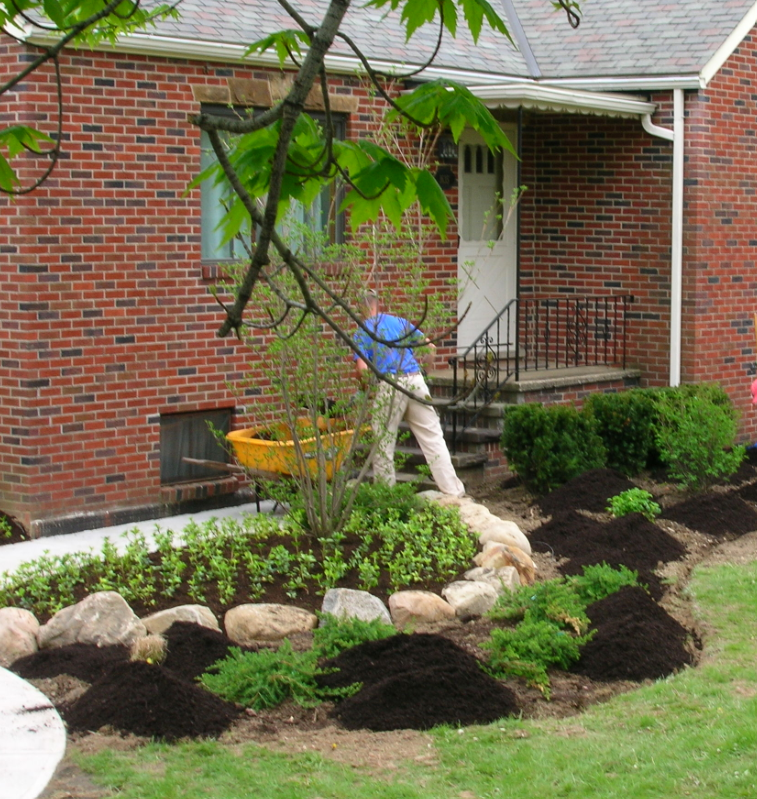
When you own land, you have complete authority over its use, development, and future modifications.
Unlike apartments, where structural changes are restricted, owning a compound allows you to build, renovate, or expand your home as needed. It will be easy to upgrade your bungalow to a maisonette.
Potential for Expansion
Land allows you to extend your home, add additional structures, or even build rental units for extra income. This option is not available in apartments, where space is fixed.
Outdoor Space for Leisure and Gardening
A compound allows for a personal garden, outdoor entertainment space, a play area for children, or even a home farm. Such benefits enhance the quality of life and contribute to a serene living environment.
Greater Privacy
Unlike apartments, where walls and common areas are shared with neighbors, an own-compound house offers seclusion.
You can enjoy your space without the disturbances of shared hallways, noise from upstairs or downstairs units, or frequent encounters with other residents.
Higher Property Appreciation
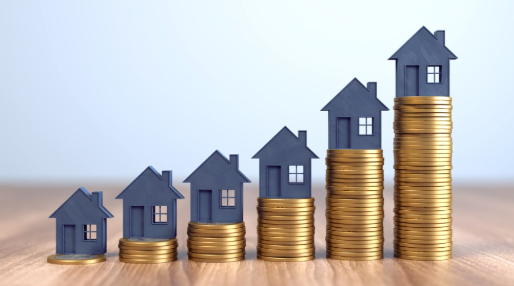
Land value generally appreciates over time, making an own compound house a solid long-term investment.
In many areas, land appreciates faster than apartments, ensuring homeowners can benefit from increased property value over the years.
Freedom to Develop Alternative Income Streams
You can use part of your land for rental units, commercial purposes, or agribusiness. This provides extra income and financial stability, which is not an option in an apartment setting.
No Service Fees or Shared Expenses
Apartment owners often pay monthly service charges for maintenance, security, and shared amenities. With your own compound house, you eliminate these recurring costs, maintaining complete control over how your home is managed.
Customization Without Restrictions
Living in an apartment often comes with strict homeowners’ association rules on exterior design, noise levels, and renovations. Owning a compound allows full customization, from landscaping to architectural design, without external approvals.
By weighing these advantages, potential homeowners can determine whether their compound house aligns with their long-term goals.
Disadvantages of Not Owning Any Land for Apartment Owners
While apartments offer affordability, convenience, and security, the absence of land ownership limits expansion opportunities, customization, and long-term investment potential.
Prospective buyers should weigh the following factors when deciding between an apartment and a compound house.
Lack of Permanent Land Ownership Rights
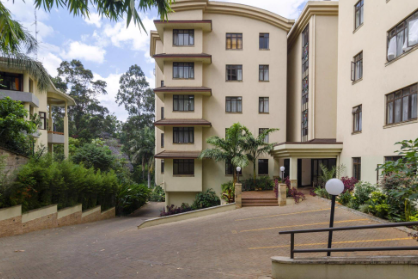
When you buy an apartment, you are purchasing the unit itself but not the land on which it sits. This means you have no control over the land and must adhere to the terms set by the property developer or management.
Limited Expansion and Customization
Unlike owning a standalone home with land, apartment owners cannot expand their living space by building extra rooms or structures.
Significant renovations are often restricted by property management rules or homeowners’ associations.
Risk of Lease Expiration in Leasehold Properties
Many apartments in Kenya are built on leasehold land, meaning the land lease will eventually expire. Renewing it could be costly, or in some cases, the government may reclaim the land, affecting property value.
Shared Ownership and Decision-Making Challenges
Since land ownership remains with the developer or management, decisions regarding common areas, parking, or future development must be made collectively. This can lead to conflicts or restrictions on how the land is used.
Vulnerability to Redevelopment or Demolition
An apartment building could be marked for demolition or redevelopment in areas undergoing rapid urban development.
Since you don’t own the land, you may have little say in such decisions, and compensation (if any) might not reflect the apartment’s actual value.
Limited Control Over Property Value Appreciation
Unlike owning land, which typically appreciates over time, apartment values can stagnate or decline due to oversupply, poor maintenance, or changing market trends.
Without land ownership, the ability to leverage the property for long-term wealth accumulation is reduced.
Dependence on Service Charges and Management Rules
Apartment owners must pay monthly service charges for security, maintenance, and utilities.
Since they don’t own the land, they cannot independently manage services like garbage collection or landscaping, making them reliant on the property management team.
No Option for Alternative Uses
Owning land allows homeowners to use it for alternative income-generating purposes, such as farming, building rental units, or commercial activities.
With an apartment, you are limited to residential use and cannot develop the land for other purposes.
Conclusion
The choice between an apartment and a compound house depends on individual needs, financial situation, and lifestyle preferences. If affordability, security, and convenience are your priorities, an apartment is a great choice.
If you value space, privacy, and long-term investment potential, an own-compound house is the way to go. Weighing these factors carefully will help you make a decision that aligns with your homeownership goals.
